News & Updates
Lotus - A trusted name in family travel
 Any mention of the word “spicy” often reminds people of hot peppers, which turn red when ripening. In China, the color red is the color of auspiciousness and prosperity, symbolizing good luck, happiness, and a rich life.
Any mention of the word “spicy” often reminds people of hot peppers, which turn red when ripening. In China, the color red is the color of auspiciousness and prosperity, symbolizing good luck, happiness, and a rich life.
Most people from southern China love spicy food, especially those from Sichuan,Hunan, and Guizhou provinces. These places frequently have wet and rainy days, and spicy food helps to eliminate moisture from the body, so people in these provinces naturally gravitate toward spicy food. As the saying goes, “四川人不怕辣, 湖南人辣不怕, 贵州人怕不辣(Sìchuānrén búpà là, húnánrén là búpà, guìzhōurén pà búlà.)” — Sichuan people are not afraid of spiciness, Hunan people don’t fear eating spicy food, no matter how spicy it is, and Guizhou people are afraid of eating food that isn’t spicy.
The Tongue-Numbing “Flower Pepper” of Sichuan Province
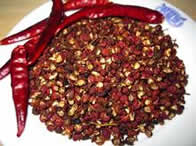 “四川(sìchuān)” is known as “川(chuān)” for short, so Sichuan Cuisine is also called “川菜(chuāncài).” When it comes to “川菜(chuāncài),” the first thing that comes to Chinese people’s minds is the “花椒(huājiāo) flower pepper/Chinese prickly ash.” The Sichuan-style spiciness that comes from “花椒(huājiāo),” described as “麻辣(málà),” is widely popular around the whole country. This special spiciness leaves a sensation on the tongue that is spicy, burns, and slightly numbs. Sichuan people also have a number of recipes using “花椒(huājiāo),” which really bring out its unique flavor and effect on the tongue. When talking about Sichuan’s “花椒(huājiāo),” one can’t leave out the number one specialty it is used in — “麻辣火锅(málà huǒguō) spicy hotpot.”
“四川(sìchuān)” is known as “川(chuān)” for short, so Sichuan Cuisine is also called “川菜(chuāncài).” When it comes to “川菜(chuāncài),” the first thing that comes to Chinese people’s minds is the “花椒(huājiāo) flower pepper/Chinese prickly ash.” The Sichuan-style spiciness that comes from “花椒(huājiāo),” described as “麻辣(málà),” is widely popular around the whole country. This special spiciness leaves a sensation on the tongue that is spicy, burns, and slightly numbs. Sichuan people also have a number of recipes using “花椒(huājiāo),” which really bring out its unique flavor and effect on the tongue. When talking about Sichuan’s “花椒(huājiāo),” one can’t leave out the number one specialty it is used in — “麻辣火锅(málà huǒguō) spicy hotpot.”
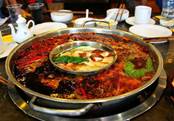
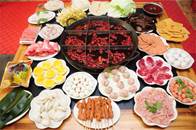 The Chinese have strong family values and like to spend time with each other, so the most enjoyable meal is to eat hotpot with family and friends! When eating hotpot, one gets to enjoy different kinds of foods, and it’s also a great chance to chat with each other during the dinner festivities; it’s certainly a good way to bond and build relationships. Many Sichuan families also love to eat “麻辣火锅(málà huǒguō)” during the Spring Festival. “麻辣火锅(málà huǒguō),” with “花椒(huājiāo),” pepper oil, dry red pepper, etc. as the ingredients of its soup base, which stands out with its fire-red color when boiling. So, eating the red “麻辣火锅(málà huǒguō)” is believed to bring a prosperous and lucky new year.
The Chinese have strong family values and like to spend time with each other, so the most enjoyable meal is to eat hotpot with family and friends! When eating hotpot, one gets to enjoy different kinds of foods, and it’s also a great chance to chat with each other during the dinner festivities; it’s certainly a good way to bond and build relationships. Many Sichuan families also love to eat “麻辣火锅(málà huǒguō)” during the Spring Festival. “麻辣火锅(málà huǒguō),” with “花椒(huājiāo),” pepper oil, dry red pepper, etc. as the ingredients of its soup base, which stands out with its fire-red color when boiling. So, eating the red “麻辣火锅(málà huǒguō)” is believed to bring a prosperous and lucky new year.
It is also important to pay attention to the “eating order” when having hotpot since a correct order makes the meal healthier. You can order mutton, beef, seafood, lettuce, tofu, potatoes, sweet potatoes, and more, but the healthiest way is to eat vegetables first and then meat. Hotpot is loved by locals and foreigners alike. When visiting China in 2013, David Cameron, the British Prime Minister, said that hotpot in Chengdu, Sichuan Province is what he most wanted to eat during that visit. The good news is that hotpot has become popular in a number of locales throughout the world. There might be a hotpot restaurant in your town, so go and taste this spicy Sichuan favorite!
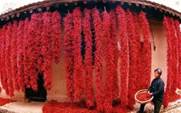 Chili Spiciness in Hunan
Chili Spiciness in Hunan
Hunan Province is called “湘(xiāng)” for short. To Hunan people, the spicy flavor within the five flavors (sweet, sour, bitter, spicy, and salty) is something more than a kind of flavor. It is the zingy piquant, prickling feeling when it touches the tip of your tongue. This feeling is said to increase the eater’s appetite, which is an enjoyment that spice-lovers look for when dining.
 In China, “辣椒(làjiāo) chili” has rich cultural connotations. The fire-red chilies, connected with feelings of joy and celebration, symbolize colorful and thriving lives. It is known throughout all of China that Hunan people are fond of eating chilies. They love them so much that they can’t have a meal without red, hot peppers. It seems that for Hunan people, a feast is not complete without chilies ! So, for Hunan cuisine, chilies play an all-important role in cooking, no matter whether the food is cooked by stir frying, braising, steaming, pan frying, stewing, boiling, simmering, deep frying, or simply served raw as a cold dish in sauce.
In China, “辣椒(làjiāo) chili” has rich cultural connotations. The fire-red chilies, connected with feelings of joy and celebration, symbolize colorful and thriving lives. It is known throughout all of China that Hunan people are fond of eating chilies. They love them so much that they can’t have a meal without red, hot peppers. It seems that for Hunan people, a feast is not complete without chilies ! So, for Hunan cuisine, chilies play an all-important role in cooking, no matter whether the food is cooked by stir frying, braising, steaming, pan frying, stewing, boiling, simmering, deep frying, or simply served raw as a cold dish in sauce.
Interestingly, it is said that Hunan girls, who may look sweet and delicate at first glance, get fired up, outspoken, and fearless when eating spicy food. Thanks to this reputation, they have earned the name “辣妹子(làmèizi)”, indicating that these girls are as enthusiastic as fire, independent, and bold. In Chinese, there is a popular song called 辣妹子(làmèizi), sung by the famous Chinese singer Song Zuying. The song praises the Hunan “辣妹子(làmèizi)”, fearing no spicy food.
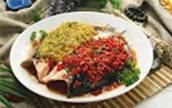 There is a Hunan specialty which also deserves your full attention — “剁椒鱼头(duòjiāo yútóu) Fish head steamed with chopped chili”! Preparation of “剁辣椒(duòlàjiāo)” is not too difficult: chop up red chilies, put them into earthen jars and preserve them for a few days. This chopped chili tastes spicy, fresh and salty, and of course, the flavor is a little bit heavy. Now for the main course! “剁椒鱼头(duòjiāo yútóu)” is also called “鸿运当头(hóngyùn dāngtóu) good luck strikes one’s head” and “开门红(kāiménhóng) good start” since “鸿(hóng)” and “红(hóng) red”, the color of the chopped chilies, are homophones and the “头(tóu) head” here refers to the fish head, which also symbolizes a new start.
There is a Hunan specialty which also deserves your full attention — “剁椒鱼头(duòjiāo yútóu) Fish head steamed with chopped chili”! Preparation of “剁辣椒(duòlàjiāo)” is not too difficult: chop up red chilies, put them into earthen jars and preserve them for a few days. This chopped chili tastes spicy, fresh and salty, and of course, the flavor is a little bit heavy. Now for the main course! “剁椒鱼头(duòjiāo yútóu)” is also called “鸿运当头(hóngyùn dāngtóu) good luck strikes one’s head” and “开门红(kāiménhóng) good start” since “鸿(hóng)” and “红(hóng) red”, the color of the chopped chilies, are homophones and the “头(tóu) head” here refers to the fish head, which also symbolizes a new start.
 Making this famous Hunan delicacy is easy enough for you to give it a try at home — put enough “剁辣椒(duòlàjiāo)” on the fish head and steam it in a pot for a few minutes until fully cooked. That’s it! This dish successfully combines the freshness of fish heads and the spiciness of chopped chilies, plus it packs in a truly unique flavor. You can find this special dish in almost any restaurants and hotels, and it is also a typical home-style dish for Hunan people. If you’re not accustomed to eating fish head you should really give this a taste anyway. You never know, you might really enjoy it!
Making this famous Hunan delicacy is easy enough for you to give it a try at home — put enough “剁辣椒(duòlàjiāo)” on the fish head and steam it in a pot for a few minutes until fully cooked. That’s it! This dish successfully combines the freshness of fish heads and the spiciness of chopped chilies, plus it packs in a truly unique flavor. You can find this special dish in almost any restaurants and hotels, and it is also a typical home-style dish for Hunan people. If you’re not accustomed to eating fish head you should really give this a taste anyway. You never know, you might really enjoy it!
It is said that you haven’t really eaten Hunan cuisine until you have had a taste of “剁椒鱼头(duòjiāo yútóu)”! It is said that Hunan cuisine tastes fresh and spicy, while Hunan people are friendly and kind.
Sources: Adapted from echineselearning.com